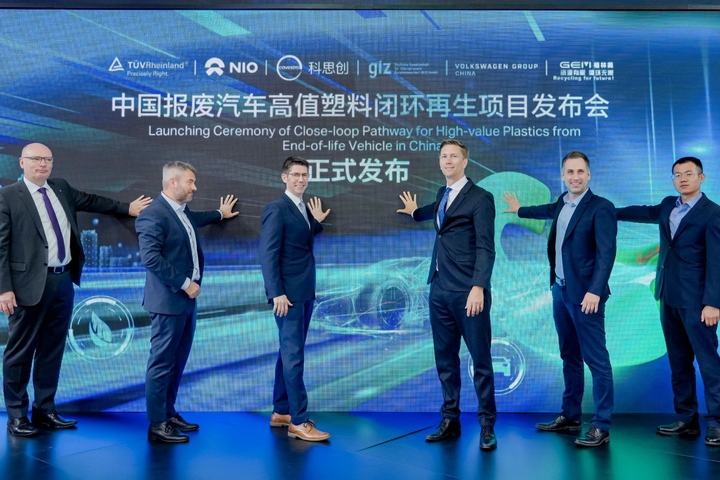COVESTRO
Launch of polycarbonates made from chemically recycled post-consumer waste
By Plasteurope.com correspondent
German engineering plastics producer Covestro (Leverkusen; www.covestro.com) has announced the launch of its first range of polycarbonates based on chemically recycled, attributed material from post-consumer waste.
German engineering plastics producer Covestro (Leverkusen; www.covestro.com) has announced the launch of its first range of polycarbonates based on chemically recycled, attributed material from post-consumer waste.
 (l. to r.) Lutz Frankholz (TÜV Rheinland Shanghai & Suzhou), Danilo Teobaldi (head of advanced technologies, NIO), Guido Naberfeld (Mobility Global sales & marketing head, Covestro), Martin Hofmann (head of Climate, Energy, Environment and Biodiversity at GIZ), Simon Krämer (head of sustainability product in R&D, Volkswagen China), and Qing Guo (assistant to the president of GEM Green Industry, Wuhan, Innovation Research Institute) (Photo: Covestro) |
Made via the mass-balance method, the new Makrolon RP series complements Covestro’s existing portfolio of sustainable PCs, which includes the Makrolon R series of mechanically recycled products and Makrolon RE series, produced using biowaste and bio-residues.
The input for Makrolon RP grades is being provided by Borealis (Vienna; www.borealisgroup.com) and Neste (Espoo, Finland; www.neste.com), which is to provide recycled feedstock for new polymers. Borealis then turns these polymers into phenol and acetone before the material finds its way to Covestro’s site.
The RP series offers identical quality as incumbent fossil grades and belongs to Covestro’s CQ family. Plastics in the new range are produced exclusively at certain sites using renewable electricity, such as Krefeld-Uerdingen in Germany, the company said.
Related: US-based Encina to provide chemically recycled circular feedstock derived from post-consumer plastics
Covestro announced at the recent Chinaplas trade fair in Shanghai that it, along with partners from the automotive value chain, is taking part in a joint pilot programme initiated by the German Society of International Cooperation (GIZ, Bonn; www.giz.de/en) to create an efficient and sustainable car-to-car closed-loop recycling system.
As part of the pilot programme, a team of professionals will explore methods to recycle and process waste polycarbonate components, such as end-of-life car headlights, into post-consumer recycled polycarbonates. Partners include NIO from China, Volkswagen, Chinese recycling company GEM, and third-party certification bodies like TÜV Rheinland, Covestro said.
28.05.2024 Plasteurope.com 1148 [255410-0]
Published on 28.05.2024
